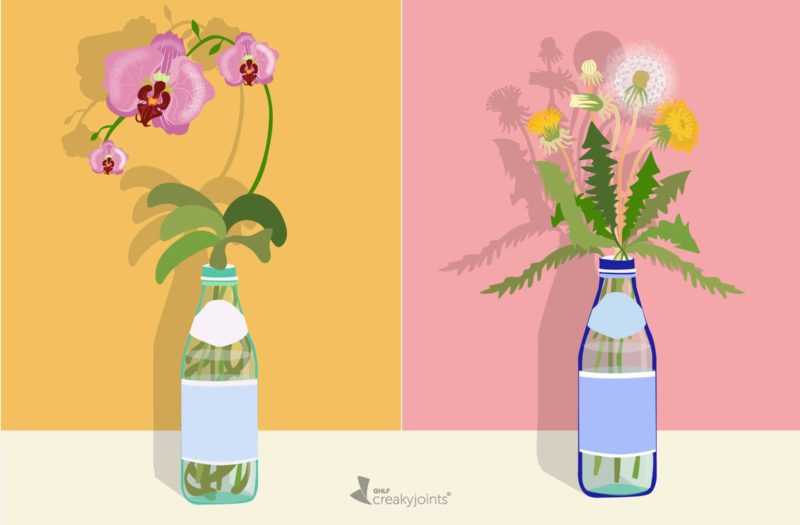Learn more about our FREE COVID-19 Patient Support Program for chronic illness patients and their loved ones.
This has been reviewed and updated as of May 11, 2020.
You’re probably atypical if you’re reading this. You or somebody you love lives in a complicated body. Complicated bodies struggle with basic functions like eating, moving, working, and sleeping. I have a complicated body because of my ankylosing spondylitis, which I’ve been living with for nearly two decades.
I like to think of these bodies as orchids in a sea of dandelions.
Orchids require special care under the best of circumstances, while dandelions grow everywhere — no matter where they land, or what’s happening around them.
Orchids, like those of us living with various forms of chronic pain, are the botanical Goldilocks. They need just enough sun to function, but not so much that they’ll burn. They require a perfect room temperature. They demand just the right amount of water to drink, even though their roots or “feet” can’t abide being wet. I saved the best for last: They need a growth medium rather than actual dirt or soil. Hmmm, are orchids even from this planet?
Painsomnia, or the inability to sleep at night due to manifestations of pain and disease symptoms, is a widespread manifestation of our orchid status.
Painsomnia occurs happens when illness, treatments, anxiety, or other unidentified cause prevents people getting enough sleep or rest, even though they’re tired and want to rest. Painsomnia can present as difficulty finding a comfortable position, trouble falling or staying asleep, or generalized sleeplessness.
Our culture pushes forward an impossible mythology of toughness and triumph rather than the mundane facts of life. But most humans are not tireless machine propelled by the fuel of grit and determination. This is especially true of those living with chronic illness and disabilities.
This triumphant myth makes it hard to embrace orchid life.
That’s uncomfortable for non-orchids to acknowledge, embrace, and empathize with. But remember that we deserve to have our needs met even when they deviate from the dandelion standard.
Managing Painsomnia During the Age of COVID-19
Everything about the COVID-19 pandemic makes even mediocre self-care seem luxurious in comparison. The pandemic has upended everything about our lives with, frankly, no resolution in sight.
Our communities are reeling from uncertainty around access to food, shelter, money, and treatments.
Quarantines and lockdowns create the false impression that life is canceled. Nothing could be further from the truth. Our lives and needs are now.
Here are some ways to improve the quality of your sleep and rest if you’re wrestling with more painsomnia than usual because of coronavirus-related stress and anxiety.
Carefully consider how to spend your lockdown time
I’m not talking about learning Catalan or writing a novel. Those are great things to do, but the most important thing for orchids is to protect ourselves.
The pandemic and news surrounding it is magnetic and must be handled with caution. Place limits on news, unstructured social media scrolling, and any other zombie consumption behaviors. Psychologist Laurie Ferguson, for example, recommends “intermittent fasting” when it comes to coronavirus-related news consumption. This may require deleting social media from your devices until this situation has stabilized.
Follow important pandemic news through the Global Healthy Living Foundation Patient Support Program and with a daily digest of updates sent to your inbox. Check this only once a day.
Try out constructive alternatives to mood-crushing media
What are some safe shows, movies, or music? What are three to five activities that might see you through this? Give a longtime friend a call. You know, those beautiful people you keep missing like ships in the night? Call them!
Create a space that welcomes sleep and rest
The typical “dandelion” sleep hygiene commandments are valuable, but orchids need more. We must jealously guard our ability to rest like the world is trying to steal it, because that is exactly what’s happening.
Brush up here on the painsomnia basics and read this list below carefully. Much of it may seem pat or “been there, done that” but re-read it in light of your coronavirus daily schedule and see what you can adapt or apply.
1. Limit caffeine and other stimulants before bed.
2. Don’t consume upsetting media or argue on the internet before bed.
3. Try to start winding down at the same time each day. Consider going to bed earlier during this stressful time.
4. Check in with yourself about your pain levels as you start winding down. Review your best methods of treating pain if your discomfort seems likely to interrupt sleep. You can use our ArthritisPower app to track your symptoms and disease activity and share your results with your doctor.
5. Use distractions like soothing sounds, picture books, or meditation to wind down or ride out difficult moments.
6. Read an old-school book rather than a digital version on your e-reader.
7. Call your health care provider for a revised care plan if your symptoms are starting to feel out of control.
Keep in mind that we’re living through a worldwide historical event that will be covered in textbooks for generations to come. That is bigger than anything we do “right” or “wrong.” This pandemic is bigger than all of us. Take things one day at a time and do what you need to do to help your orchid-self thrive.
Get Free Coronavirus Support for Chronic Illness Patients
Join the Global Healthy Living Foundation’s free COVID-19 Support Program for chronic illness patients and their families. We will be providing updated information, community support, and other resources tailored specifically to your health and safety. Join now.






